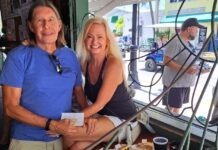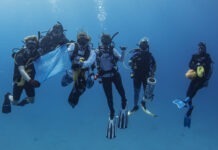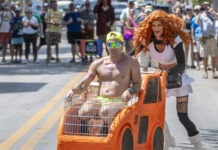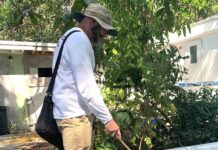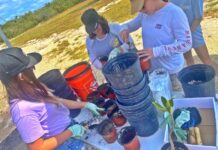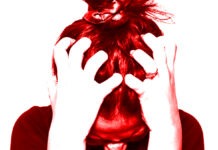I remember the breeder’s place was in an orange grove just north of Okeechobee. There was a barn with two walls (a pole held up the fourth corner of the roof), a wire pen in the dirt and a small pond. Also, there were puppies everywhere, misbehaving in all sorts of ways, like a page out of a children’s book.
We got out of the car and one of the puppies came up and sat on my foot. She had a brown head, properly called liver by German Short-haired Pointer enthusiasts, and a tick body, tick being the freckled brown-and-white coat that GSPs get.
We were like, “You’re cute, dog, but there are eight other puppies here and we’re gonna look around a bit.”
She gave us a look that said, “Don’t bother, it’s going to be me.”
Turned out she was right. We paid for her with poker winnings from a lucky streak the night before.
Driving away, she threw up three times in the first 20 miles, mostly into my beloved Jersey Devil – the demon, not the hockey team – baseball hat. Cars did not seem to be her thing. Also, she did not seem fond of the song “Code Monkey” by Jonathan Coulton, which we couldn’t understand. It’s a great song.
We made it to the Everglades Rod & Gun Club that first night, Key West the next. I’m not sure if she ever went north of Marathon after that.
We named her Eleanor Zissou of Aquitaine for reasons that probably don’t make much sense outside of our household, but mostly we called her Elly.
We wanted a German Short-hair for a number of reasons. For one, they are just damn fine-looking dogs. Sleek and fast and beautiful when they run. I might not have gone with the docked tail if given my druthers, but I can’t say it didn’t slay me whenever she wagged it real fast. Also, GSPs don’t shed, and they seem to tolerate the Florida heat pretty well.
But also, I’m a birdwatcher and pointers are bird dogs. Unlike, say, Labrador Retrievers, who are trained to put their mouths on birds for the retrieving bit, I figured a pointer might have more journalistic urges. Instead of chasing a bird, maybe she’d just be inclined to point it out to me. (“Psst, dude, check out the tanager in that copse over there…”)
Three of her litter mates were bought sight unseen and air shipped to a hunting ranch in Nebraska. Elly seemed pretty calm, but as she went from puppy to adulthood I worried that her prey drive would grow strong, and that she might become hard to control around wildlife. Ha.
From her earliest of days she had no interest in the kind of critters dogs traditionally chase. She’d be standing 3 feet from a chicken and refuse to acknowledge it, or even look directly at it. An iguana would walk across the porch and start up the mahogany tree and she’d head to the front of the house as if she had an important phone call to make. She did get hours of entertainment out of chasing the much smaller curly-tailed lizards around our backyard, but never actually caught any of them.
We would periodically remind her of her three Nebraska-bound siblings, and how lucky she was to have ended up with soft-hearted people like ourselves. She would look at us for a second, then yawn and lay her head down on the nearest pillow, refusing to acknowledge this fact the same way she refused to acknowledge chickens.
She was a good looking dog, so I would show her pictures by photographers like William Wegman and Theron Humphrey. I’d explain to her how they’d both built careers by working with their dogs to create funny and often touchingly nuanced images, and how she needed to be more careerist in her ambitions. But whenever I tried to pose her, she would generally look in the wrong direction, or sit down when she needed to stand, or just wander away, though she did master the fine art of giving me the disapproving side eye.
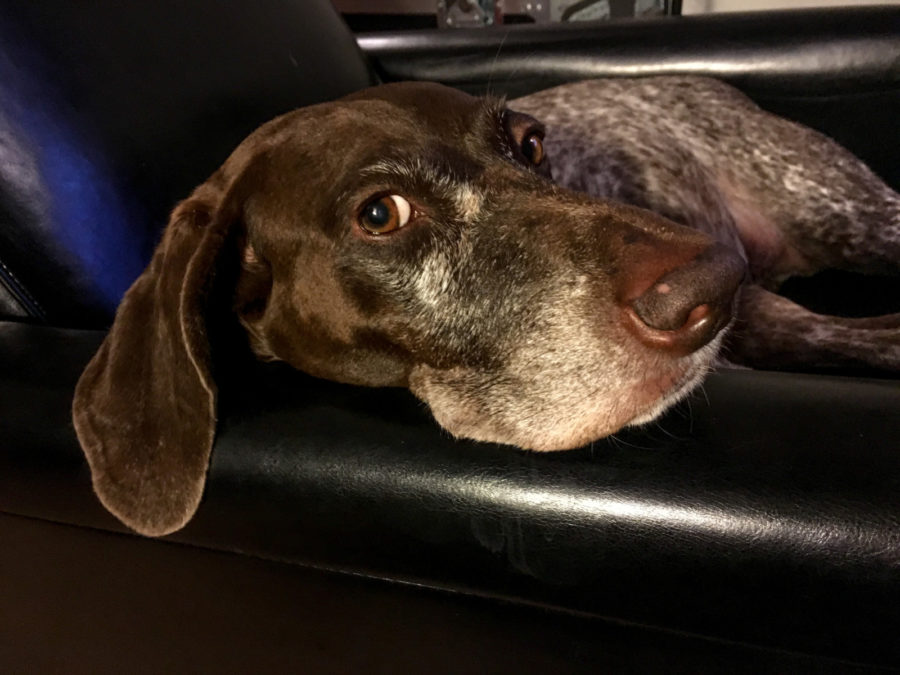
At some point we realized her defining personality characteristic was that, while she clearly loved us and thought of us as her people, she had no interest in pleasing us, in seeking our approval, or in giving up much of her personal autonomy. It was a trait I came to deeply admire and occasionally try to emulate.
Elly did have other skills. She could surf the edge of the kitchen counters looking for carelessly unguarded food like nobody’s business. She could pronghorn leap up onto a table, or over the back of the couch, or onto my lap while I was working if I wasn’t paying attention. (I don’t think any dog has made me say “oof” so often.) She could catch a frisbee in the air. She could steal a sandwich from a deli plate in a room full of people. She could make two full-grown adults sleep in the 18-inch margins on the sides of the bed while she luxuriated in the middle.
She had an inordinate fondness for men. On poker nights she would sit with her chin resting on the back of the couch and just stare, leaving her vantage point only if someone dropped a potato chip or something, but returning to her post quickly. She also had a serious fondness for paper, stealing and chewing up paper napkins and towels whenever she could. One morning, after I had won a pretty serious poker game, I threw my shorts carelessly into a corner of the bedroom, then woke to find her staring at me with a large roll of cash in her mouth. (I realize this column might make it sound like I win at poker often. I do not.)
It was my wife she trusted, though – the one she would go to when she was scared or tired or hungry or needed someone to play fetch with in the hallway at midnight.
She went gray across the bridge of her nose first, then around the eyes, then through the muzzle. She lost the ability to jump clear up onto a table, then the ability to leap over the back of the couch, or onto the bed, or even to climb up into her favorite chair.
We realized she was failing slowly, then quickly, though it was impossible that she’d suddenly gotten that old, that frail. She was throwing up in my hat just the other day. But we lost her, and we’re probably not going to be quite right for some time.
